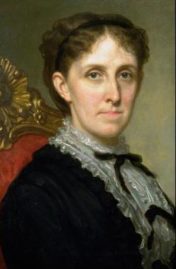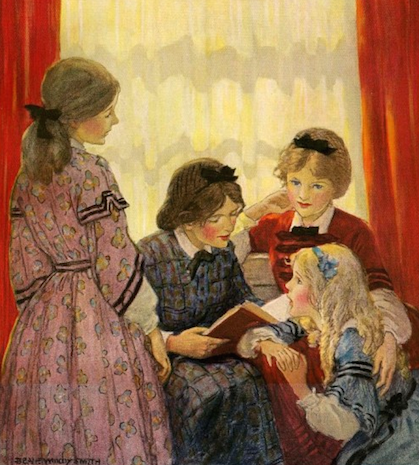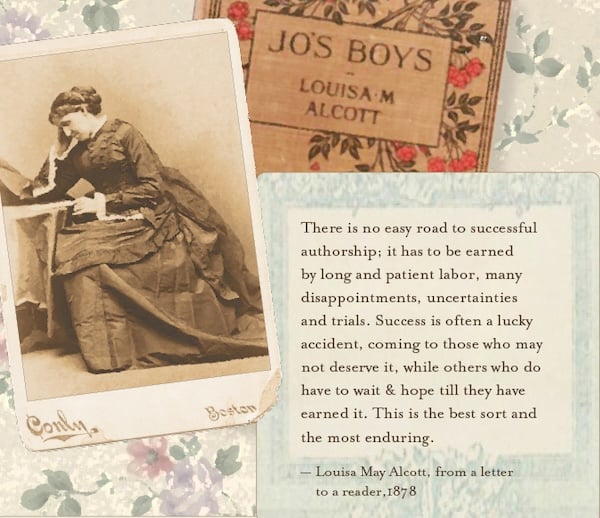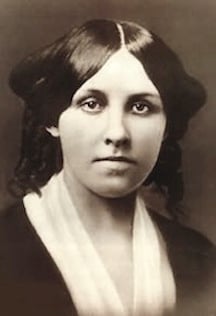Louisa May Alcott, author of Little Women
By Nava Atlas | On April 1, 2018 | Updated November 30, 2024 | Comments (0)

Louisa May Alcott (November 29, 1832 – March 6, 1888) is best known as the author of Little Women and its sequels, including Jo’s Boys and Little Men, though the scope of her work goes far beyond these beloved books.
She also wrote essays, poems, and pseudonymous thrillers. Alcott’s most beloved heroine, the complicated and talented Jo March, was an idealized version of herself.
She did grow up in a family much like the one she presented in Little Women — once again, idealized and a bit altered — with practical and wise Marmee, a dreamer of a father, and three sisters, May (“Amy”), Anna (“Meg”), and Elizabeth (“Beth”).
Louisa May Alcott biography highlights
- Louisa started her writing career by producing gothic tales and thrillers under pseudonyms.
- She was part of a progressive family that promoted abolition of slavery, women’s rights and suffrage, and other social justice causes.
- Louisa wasn’t shy about her ambition to become a writer and to get properly paid for her efforts. Poor for most of her life, and having had to provide for her parents and sisters from the time she was a teen, she eventually earned a great deal of money.
- Her best-known novel, Little Women, was semi-autobiographical, though offered an idealized view of the Alcotts. Louisa is most identified with the character of Jo, who in turn inspired numerous women writers.
- Louisa briefly served as a Union nurse during the Civil War, but had to cut her service short due to serious illness.
- Louisa never married nor had any of her own children, but helped raise her sister’s daughter after her sister’s death.
- Her body of work includes more than 10 novels and numerous short stories (both written under pseudonyms and her own name).
- Little Women continues to be a beloved classic and has been filmed for television and movies many times. It has also been adapted to the stage.
Alcott was born in Germantown, Pennsylvania, and grew up in Boston and Concord, Massachusetts. Like Louisa, Jo March was the aspiring writer among the sisters of Little Women.
What’s less well-known is that Alcott produced a large body of thrillers (otherwise known as gothic or sensational tales) under various pseudonyms, allowing her to support her family while searching for her literary voice.
Contrary as they seemed to her own life and values, she seemed to take some perverse pleasure in dark themes, returning to them even after financial need no longer compelled her to do this sort of formula writing.
. . . . . . . . . .
10 Women Writers Who Were Inspired by Jo March
. . . . . . . . . .
Determined to make a living as a writer
Alcott conducted her career as a professional determined to profit from her pen. Financial need stoked her drive as she became the primary breadwinner in her family at a young age.
Inspiration was all around her, as she grew up in the midst of the Transcendentalists. A philosophical, literary, and political movement that began to flower in the late 1820, some of its members included her father, Amos Bronson Alcott, Ralph Waldo Emerson, Henry David Thoreau, and Margaret Fuller. Bronson Alcott was one of its most passionate and radical proponents. He was a brilliant social theorist, but a poor provider, causing continuous financial stress for the family.
Louisa admired Charlotte Brontë and longed to gain recognition for her work, much as Brontë had. Though Louisa claimed that her greatest reward was the esteem of the “young folks” who were her readers, she was never modest in her demands to be paid what she felt she was worth, and lived to see her work earn a fortune. Most important to her was to make her family, especially her Marmee, comfortable.
A brief stint as Civil War nurse
During the Civil War, Louisa would have surely taken up arms if women had been allowed to serve as soldiers. But the only way women could serve was to volunteer as nurses, and that’s just what she did.
After the crushing defeat of Union forces in Fredericksburg, December 1862, Louisa began her duties as a nurse at the Union Hotel in Georgetown, Washington D.C.
Disease was nearly as much a threat as wounds from the battlefield — not only to the soldiers themselves, but to those who cared for them. Not even a month into her service, Louisa came down with typhoid pneumonia, complete with a horrendous cough and a high fever.
Her father came to fetch her and take her home, and she was in a delirium for some time after. More about this in her own civil war journals.
. . . . . . . . . .

. . . . . . . . . .
Little Women
Though Alcott had already produced the well-received Moods (the first novel under her real name), Work: A Story of Experience, Hospital Sketches, and countless small pieces under her own name, it was Little Women that really put her on the map. In 1868, her publisher asked that her to try writing a “girls’ story” for their list.
Thinking little of the request, she cranked it out in two and a half months, though her heart wasn’t in it. Neither she nor her publisher thought it was in any way remarkable.
Still, the proof of the entire book was ready in a month or so after the author turned in the manuscript, and once it came out, it was an immediate success, so much so, that sequels quickly followed.
. . . . . . . . . .

. . . . . . . . . .
A staunch feminist and abolitionist
She promoted women’s rights and campaigning for women’s suffrage. Her views were espoused by her lead characters, strong young women who wanted more from life than to get married and have babies.
Alcott herself never married nor had children. She and her family were always ardent abolitionists, a view that was not as widely popular in relatively liberal Massachusetts as one would think.
Despite all that she’d seen in life, Alcott was alarmingly naïve about the nature of her sexuality. She confessed in an 1883 interview: “I am more than half-persuaded that I am a man’s soul, put by some freak of nature into a woman’s body … because I have fallen in love in my life with so many pretty girls and never once the least bit with any man.”
Perhaps unknowingly, the repressed nature of her sexuality helped her avoid the circumscribed path of marriage and motherhood, and allowed her to view the institution dispassionately.
. . . . . . . . . .

. . . . . . . . . .
A brief experience with motherhood
May Alcott Niereker, the youngest Alcott sister, trained as an artist in Europe (subsidized by Alcott’s earnings). There she met a man, married, and had a daughter. She died within a year of giving birth. Alcott wanted to raise the child, and earned the father’s family’s consent do so.
Adopted at the age of two, the little girl was her Aunt Louisa’s namesake (and nicknamed Lulu); from all accounts, the nine years they spent together before Alcott’s death were happy ones.
Chronic illness and death
Louisa May Alcott was 55 years old when she died of a stroke in Boston in 1888. Her death came just two days after her father’s.
She had long suffered from chronic illness, long thought to have been caused by the mercury-laced medicine she took as a cure for the typhoid fever she suffered while serving as a nurse during the civil war. However, modern scholars believe that she may have had an autoimmune disease, perhaps lupus.
. . . . . . . . . .

10 Life Lessons from Louisa May Alcott
More about Louisa May Alcott
On this site
- 10 Women Writers Who Were Inspired by Jo March
- Louisa May Alcott quotes
- How Louisa May Alcott’s Feminism Explains Her Timelessness
- How Alcott Came to Write Little Women
- A Visit to the Alcott’s Orchard House
- Sweet Success at Last for Louisa May Alcott
- 10 Life Lessons from Louisa May Alcott
- A Feminist Manifesto — Work: A Story of Experience
- A Posthumous Interview with Louisa May Alcott
- Madeleine B. Stern’s Brilliant analysis of Little Women
- When You Don’t Have Enough Time to Write
- The Boundless Hearts of Mothers
- Comfort and Guidance in Little Women
- My Head is My Study
- “March” by Geraldine Brooks: A Review
- Behind a Mask: The Unknown Thrillers of Louisa May Alcott
- Louisa May Alcott’s Obituary, March 1888
- May Alcott Nierker: Thoroughly Modern Woman
- Sketch of Childhood
- LMA as Civil War Nurse
- LMA’s Civil War journals
- The 1994 Film Adaptation of Little Women
- Classic Quotes from Little Women by Louisa May Alcott
- Diana and Persis: LMA’s Unfinished Novel
- Did Little Women‘s Jo March Become a Writer?
- Dear Literary Ladies: Any Quick Tips for Plot and Character Development?
- Dear Literary Ladies: How Can a Writer Improve Her Craft?
- Dear Literary Ladies: Isn’t There an Easy Road to Writing Success?
Major Works
- Little Women
- Jo’s Boys
- Little Men
- Rose in Bloom
- Eight Cousins
- Hospital Sketches
- An Old-Fashioned Girl
- Under the Lilacs
- Moods
- Work: A Story of Experience
- Transcendental Wild Oats (full text)
- A Long Fatal Love Chase
Biographies About Louisa May Alcott
- Louisa May Alcott: A Biography by Madeline B. Stern
- The Woman Behind Little Women by Harriet Reisen
- Eden’s Outcasts: The Story of Louisa May Alcott and Her Father by John Matteson
- Louisa: The Life of Louisa May Alcott by Yonda Zeldis McDonough
- Marmee and Louisa by Eve La Plante
More Information
Film and TV adaptations of Louisa May Alcott Works
- Little Women (1933)
- Little Women (1949)
- Little Women (1994)
- Little Men (1935)
- Little Men (1941)
- Little Men (1998)
- The Inheritance (1997)
- The Inheritance (2003)
- An Old Fashioned Thanksgiving(2008)
Visit Louisa May Alcott’s Home
- Orchard House– Concord, MA
Leave a Reply